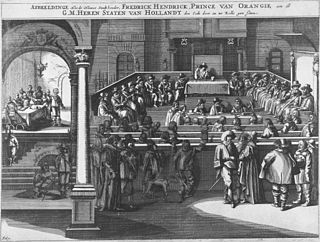
The States of Holland and West Frisia were the representation of the two Estates (standen) to the court of the Count of Holland. After the United Provinces were formed — and there no longer was a count, but only his "lieutenant" — they continued to function as the government of the County of Holland.
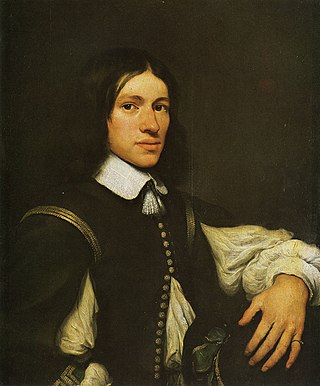
Anthonie Heinsius was a Dutch statesman who served as Grand Pensionary of Holland from 1689 to his death in 1720. Heinsius was an able negotiator and one of the greatest and most obstinate opponents of the expansionist policies of Louis XIV of France. He was one of the driving forces behind the anti-French coalitions of the Nine Years' War (1688–97) and the War of the Spanish Succession (1701–14).

Jacob Cats was a Dutch poet, humorist, jurist and politician. He is most famous for his emblem books.
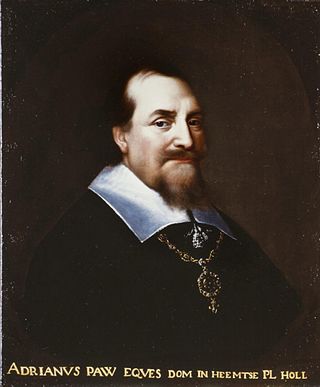
Adriaan Pauw, knight, heer van Heemstede, Bennebroek, Nieuwerkerk etc. was Grand Pensionary of Holland from 1631 to 1636 and from 1651 to 1653.

Catharina Pietersdr Hooft was a woman of the Dutch Golden Age. She became famous at a very early age, when she was painted by Frans Hals.
Van der Goes or van der Goes is a surname of Flemish-Dutch origin. Notable people with this name include:

Egbert van der Poel was a Dutch Golden Age genre and landscape painter.

Cornelis Hofstede de Groot, was a Dutch art collector, art historian and museum curator.

Jacob de Graeff was a member of the De Graeff-family from the Dutch Golden Age. He was an Amsterdam regent and held the title as 20th Free Lord of Ilpendam and Purmerland.
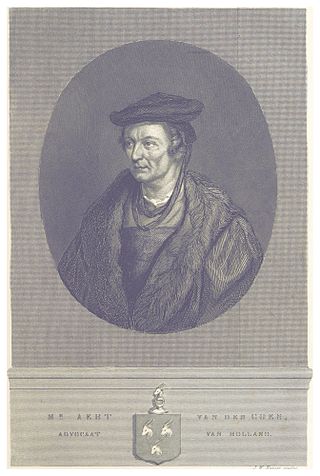
Aert van der Goes was a member of the House of Goes and a Dutch grand pensionary. He studied at the University of Leuven.

Christiaan or Christian van der Goes, a Dutch nobleman, was schout of Delft from 1562 to 1577.
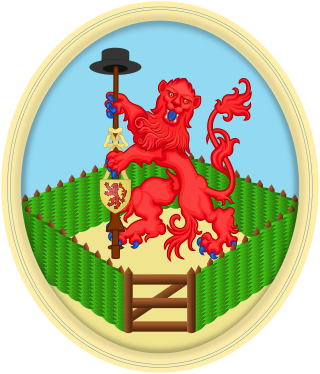
The Provisional Representatives of the People of Holland was the name given to the supreme governing body of the province of Holland, instituted after the Batavian Revolution, during the period in which the Netherlands was transitioning from the constitution under the Dutch Republic to the new constitution of the Batavian Republic. After the States General of the Batavian Republic had been replaced by the National Assembly of the Batavian Republic, in 1796, the Provisional Representatives, and similar bodies, in all Dutch provinces were abolished.
Jacob van den Eynde was a Dutch statesman, Pensionary of the Brugse Vrije, Pensionary of Delft, and Grand Pensionary of Holland.
Hugo van den Eynde was a Dutch statesman, and Pensionary of Delft. He was succeeded in this position by his son Jacob van den Eynde.

Jhr. Jacob van den Eynde was a Dutch governor of Woerden. He was the son of Grand Pensionary Jacob van den Eynde, and father of the Zeelandic poet Jacob van den Eynde, better known as Jacobus Eyndius.
Barthout van Assendelft was a Dutch Grand Pensionary.
Jan Bouwensz, also known as Jan Boudynsz and Jan Baldewini was a Dutch Landsadvocaat.
Frans Coebel van Loo, Heer of Loo, also known as François Coebel was a Dutch politician and Grand Pensionary of Holland.
Albrecht van Loo was a Dutch Grand pensionary.

Spangen Castle was a medieval castle near the village Overschie. It has disappeared completely. The Rotterdam city quarter Spangen was named for the castle.














